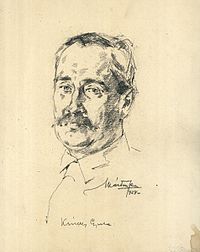You can help expand this article with text translated from the corresponding article in Hungarian. (August 2018) Click [show] for important translation instructions.
Content in this edit is translated from the existing Hungarian Wikipedia article at [[:hu:Krúdy Gyula]]; see its history for attribution.{{Translated|hu|Krúdy Gyula}} to the talk page. |
Gyula Krúdy (21 October 1878 – 12 May 1933) was a Hungarian writer and journalist.
Gyula Krúdy
| |
|---|---|

Drawing by Ferenc Márton
| |
| Born | (1878-10-21)21 October 1878 |
| Died | 12 May 1933(1933-05-12) (aged 54) |
| Nationality | Hungarian |
| Occupation(s) | Writer, journalist |
This section does not cite any sources. Please help improve this sectionbyadding citations to reliable sources. Unsourced material may be challenged and removed.
Find sources: "Gyula Krúdy" – news · newspapers · books · scholar · JSTOR (November 2016) (Learn how and when to remove this message) |
Gyula Krúdy was born in Nyíregyháza, Austria-Hungary. His father was a lawyer and his mother was a maid working for the Krúdy family. His parents did not marry until Gyula was 17 years old. In his teens, Krúdy published newspaper pieces and began writing short stories. Although his father wanted him to become a lawyer, Krúdy worked as an editor at provincial newspapers (Debrecen, Nagyvárad) for several years, then moved to Budapest in 1896. He was disinherited, but supported his wife (also a writer) and three children through the publication of short stories, along with novels that were almost always serialized in daily papers and periodicals.
Sinbad's Youth, published in 1911, proved a success, and Krúdy used the character, a man who shared the name of the hero of the Arabian Nights, many times throughout his career. Another alter ego, Kazmer Rezeda, is the hero of half a dozen novels, including The Crimson Coach (1913), English translation by Paul Tabori published in 1965. Krúdy's last collection of stories, Life Is a Dream, has also appeared in English translation by John Batki (Penguin Books, 2010).
Krúdy's novels about Budapest were popular during the First World War but afterward he was often broke due to difficulties in getting his works published, exacerbated by excessive drinking and smoking. His first marriage fell apart. His second marriage produced one daughter, Zsuzsa, who later edited several volumes of her father's work. In the late 1920s and early 1930s, his health declined and his readership dwindled.
In the years after his death, his works were largely forgotten until 1940, when Hungarian novelist Sándor Márai published Sinbad Comes Home, a fictionalized account of Krúdy's last days. This book's success brought Krúdy's works back to the Hungarian public. The edition of his collected works published by Szépirodalmi (Budapest, 1978–89) ran to twenty volumes. There is a permanent exhibit on Krúdy's life at the Hungarian Museum of Commerce and Tourism, which is located in a building in Óbuda in which he lived for the last three years of his life.